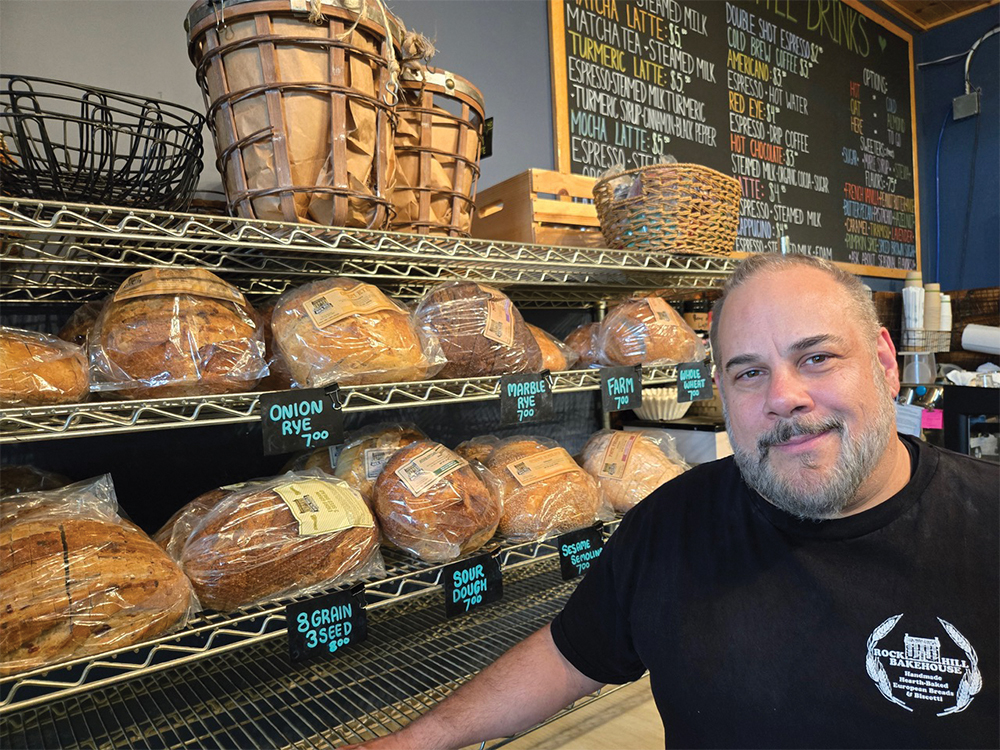
Courtesy Paul Post
By Paul Post
Rock Hill Bakehouse sells more than 14,000 loaves of bread per week, from Westchester to Lake Placid and is aiming for a 30 percent increase in production.
“That’s one of the main reasons we moved here, to get wholesale manufacturing back to a breakpoint in production,” owner Matt Funiciello said.
Wholesale accounts for about 80 percent of the firm’s business to health food stores, co-ops, supermarkets and restaurants, including ski areas and resort towns in western Massachusetts and Vermont as well.
The other 20 percent is retail, from its cozy cafe at 18 Curran Lane adjacent to The Shirt Factory in the east end of Glens Falls. Funiciello moved there five years ago, from a Route 9 strip plaza just north of Exit 17 in Moreau.
Now everything is under one roof. Previously, Rock Hill also had a café on Exchange Street in Glens Falls, in addition to the Moreau bakehouse.
“We are in the arts community now, not just serving the arts community, which is what we did in the old café,” Funiciello said. “We’re here for musicians, graphic artists; it’s a place for people to write, read and we also do shows.”
Leaving a bustling downtown, a block off Glen Street, was a bit risky. But the convenience and efficiency and being in one building outweighed this, and has paid dividends more than Funiciello could have imagined.
“Last year was the best we’ve ever had compared to the old café,” he said.
Getting there wasn’t easy, though.
“The pandemic almost killed us,” Funiciello said. “We opened here in January 2020. By the end of March or early April our doors were closed. We had massive construction loans, huge amounts of uncertainty, ingredient prices were skyrocketing and eventually labor costs skyrocketed because we were competing with unemployment that paid twice as much as I do. It wasn’t an easy business to be in, in upstate NY during that period. Just brutal.”
But Rock Hill continues to have a strong and growing presence in the regional market, despite increased competition from coffee houses and cafes with somewhat similar business models.
Kitch A Vibe Micro Eatery in Glens Falls, along with Haux Nest Bread and Uncommon Grounds in Queensbury, have all opened within the past year joining establishments such as Kru Coffee and Spot Coffee of Glens Falls.
“They all hold their own because people are looking for community and we’re losing it in so many other places,” Funiciello said. “Wi-Fi users are big users in coffee houses. There’s been a major shift in the way people work. They have jobs in the city, can do work on a laptop and have a six-dollar cup of coffee. That’s not something local people in Glens Falls were looking for five years ago.”
“More people are also looking for food made from scratch with good ingredients, not fast food,” he said. “They’re looking for food that’s healthy for them. People who really want something extra special are coming here.”
Rock Hill’s reputation for high quality, naturally leavened hearth breads is known far and wide
It’s received high praise on multiple occasions from The New York Times and has been included in books by renowned culinary aficionados such as Julia Child, James Beard and Bernard Clayton.
Funiciello and his brother, Josh, purchased the firm in 1991 from its founders Michael and Wendy London, who launched it four years earlier out of a 400-square-foot space at their farmhouse in Greenwich, Washington County.
“We packed bread in trucks on their law,” Funiciello said. “It was a cottage industry business gone awry.”
But business boomed after moving to a much larger space in Moreau.
Before long, Rock Hill had 40 employees and its bread was being served in a dozen three-star Manhattan restaurants. It also had a café at Colonie Center, a retail shop at Crossgates Mall, a kiosk in Clifton Country Mall and was churning out 30,000 loaves of bread per week.
“It was too much to manage so we downsized to doing a lot of farmer’s markets and a lot of restaurant business, which we could handle, plus supplying some retail stores in New York City,” Funiciello said.
By this time, his brother had left to pursue other interests.
The bakehouse and café have 26 employees now.
“I wanted to work with a small group of people, with a good work ethic and attitude, who I knew really well and didn’t have to manage,” Funiciello said.
He describes the workplace atmosphere as “a happy chaos and anarchy more than an authoritarian workshop with masters and peasants.”
But at 57, he’s also begun taking a serious, hard look at both his and the company’s future.
“When I go into some type of retirement, I’d like there to be an employee-ownership plan that guides the next generation into managing their own bakery,” he said. “I can’t see selling it and maintaining any kind of integrity. That matters to me.”
